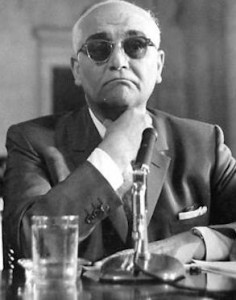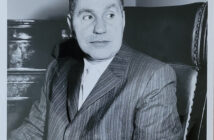Yet another revision of an organizational chart of the Chicago Outfit has been circulating around cyberspace in recent months. I am not sure who the creator of the chart is, however, I can attest that it appears to be strikingly similar to an older Chicago Outfit organizational chart that I saw several years ago that was compiled by law-enforcement (though photos didn’t appear in that chart). My only real gripe with the hyperlinked chart is that Paul Ricca was truly the chairman of the board during the years specified.
A major difference between it and some older charts has caused me to receive some requests to explain why Romie Nappi, my uncle through marriage, appears so prominently. So I would like to take this opportunity to explain a little more about my uncle and his place in the Outfit’s history.
During the early 1900s in Naples, Italy, Felix Nappi conjoined with a young woman named Assunta Iorii. This couple eventually moved to Chicago, Illinois, and lived as husband and wife until Assunta’s death in 1960. Al Capone and Paul Ricca assisted this young couple sometime after settling in Chicago. Without getting into specific reasons, it was Assunta’s now late brother, Tony Iorii, who was one of the factors in Capone and Ricca’s decision to aid the Nappis.
Felix and Assunta had several children. Among them were Ralph “Baa Baa” Nappi and Romie Nappi. Romie was eventually nicknamed “Squiege” by his brother-in-law, who is my now late father.
Ralph was born in 1911 and was 9-years older than Romie. As a young adult Ralph went to work for his Uncle Tony Iorii, who for several years was in control of a vast portion of the vice in Northern Illinois and Southern Wisconsin, a territory given to him by none other than Al Capone. In Ralph Nappi’s journey to Chicago Outfit stardom, he was a contemporary of some future Outfit icons, like Anthony “Joe B” Accardo, Sam “Teets” Battaglia, Sam “Mooney” Giancana and several other of the most notorious gangsters in American history. If Ralph would have lived to a ripe age, his name would have undoubtedly been as well known to many as Accardo and Giancana.





18 Comments
Joe, good bio on Romie Nappi and your father. Good read. Answers a lot of questions, but creates others. Wasn’t Lefty Campagna the chairman until he died in 1955? Did he have any role with Nappi? And didn’t being related to Peter Fosco help your father in any way? Thanks, Rick
Dear Antiliar,
I believe that Lefty was the Chairman until his death in 1955. However, the years specified in the chart are after 1955. Perhaps I should clarify things a bit by pointing out that Paul was basically co-chair until Lefty’s death, which allowed Paul the ability to do just about anything he wanted to do (Lefty relied on Paul for a great deal of decision making, much more than any of the others). I hope this clarifies things a bit.
Lefty had a role with Nappi. Sorry for not naming others. As Romie’s Wikipedia page shows (http://en.wikipedia.org/wiki/Romie_Nappi) (reference 3&4), Romie was sent to meet with Jack Ruby in Texas in the late 40s, which could only have been allowed with Lefty’s blessings, regardless of whichever executive on the board advocated for Romie’s involvement on the Ruby meeting. The point that I wanted to make in the article on Romie is that out of all of Romie’s enormous connections to the underworld, his friendship with Paul Ricca was one of his best connections.
While my father’s very distant relation to the Foscos closely related to Peter’s family probably helped in some ways over the years, it was undoubtedly my father’s partnership with Romie that helped him become well-to-do (as well-to-do as a thug can be considered, lol).
hey joe its been awhile. nice piece good work. by the way have you heard that johnny D. has alzheimers for real>
Hi Pat,
I know all about Johnny. Thank you for the update. I also know all about Petey too (Petey and Johnny).
Dear Joe,
Who do you think the next boss will be? Do they both have Alzheimer’s? How old are these guys anyway? When are you going to start writing articles about the Outfit again. Any updates on the “Mags” situation. This site was starting to get really good when he was on here (not that it’s bad without him). I need a “juicy” article or podcast. Thanks, and keep on keepin on!!!
Rick, have you seen this file?
http://americannewspost.com/docs/jfosco/FBI-DeadList-Update-2011.pdf
This file may take a couple of minutes to open. It is a large file.
Yes, I have the FBI Dead List and have used it to order files. Often times the FBI still requires additional proof.
One glaring omission I see in that chart is no mention of “Obbie” Frabotta. He was with the North Side and had close ties with Taylor St.
I agree, Ex, and I would add that several other relevant operatives were not listed.
Click here to read FBI documentation, which contains the release of names of deceased Chicago Outfit members and pertinent FBI agents:
http://americannewspost.com/docs/jfosco/FBI-DeadList-Update-2011.pdf
This file may take a couple of minutes to open. It is a large file.
Joe,
Good article on Nappi; not much is known about him although his name is mentioned sparingly in FBI files but nobody seems to have that much intel on him.
I also assisted with the creation of the chart linked to in the article. It was decided to cap the names at 75 as the list was never intended to be all-inclusive because of the difficulty inherent in such a task. As it was, Frabotta was the last name out.
I would be interested in knowing any other names you would add to the list.
And Antillar, whenever I request FBI files, I try to include the individual’s social security number (obtained from the SS# death index), if at all possible. I have never had a request require any more than that.
Thanks.
Sometimes I include additional material in my requests to cut down on redactions. The FBI can butcher these files so that you end up having almost page after page of white blank pages. If you include newspaper articles and census records it helps, but you still may have to appeal. Even then they still can edit the Hell out of the files. That’s why some people take them to court. To top it off, the FBI in conjunction with the National Archives has had a file destruction program that has been going on since the 1970s. I think Romie Nappi’s file was one of them. James DiGeorge was another.
A now former fixer of the old Chicago First Ward, who is like a family member to me (for obvious reasons) (he presently still lives in the Chicago area), told me in recent years that the now late
U.S. Representative Frank Annunzio assisted my Uncle Romie in arranging for specific federal records in Washington, pertaining to my father, to be destroyed. These records once caused my dad to be banned from the Teamster movement as an official. This ban occurred in the mid 1970s and genuinely caused my dad a brief hiatus from the Teamster movement (my father’s IRS record supports my claim). Note, this is the same type of circumstance that prevented Jimmy R. Hoffa from assuming a position as a union
official with the Teamster’s after he was released from prison when he received a Presidential commutation (both Hoffa and my father’s ban occurred close together in time). Unlike Hoffa, my father was cleared to assume a position as a union official with the Teamster’s despite having a federal felony on his record from the 1940s, which pertained to an old war crime. I am not suggesting
that my father’s clout was stronger than James R. Hoffa’s clout, however, I think that my father’s ability to have his baggage quietly swept under the carpet (which proved to be impossible for Hoffa to do) was possible because of the fact that my father was a low-key individual, not having the public attention that Hoffa had on him. However, I cannot understand to this day how or why those who first raised an issue about my father’s criminal record in an attempt to permanently ban him from the Teamster’s as a union official had later decided to simply forget about the matter once my father’s clout quickly destroyed the pertinent federal records that compromised my father’s position with the Teamster’s in the first
place. Not only was my father quickly cleared to resume holding a position as a union official with the Teamster’s as a felon (which is somewhat illegal), he went on to receive major promotions within the Teamster Movement and remained a Teamster Official, as a felon, for many years and until he died of Cancer in 1987. It would be interesting to hear the Teamster Movement issue a public statement explaining why my father was allowed to be the only convicted felon to hold a position with the Teamster’s as an official.
In sum, according to Navel records, my father was convicted of a felony. However, according to other federal records within the Justice System, shortly after the Teamster’s initial discovery of my
father’s felony conviction (which was detected in the mid 1970s), specific federal records regarding my father were destroyed in Washington.
I suspect that I could find a sponsor who would be willing to compensate anyone willing to spend the time researching
this matter. If anyone is interested in my offer, please email me at
JFosco@AmericanNewsPost.com.
great article and good read joe ! keem ém comming.
Thank you
Good article on my grandfather Joe, I never knew you did this.
Thanks Mike. I miss him and your grandma. It feels as if I was bringing them Gene & Jude’s hotdog’s only yesterday.